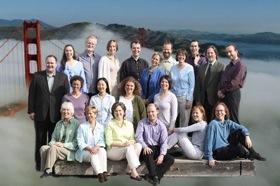
If the program’s lineup is any indication, SFCA’s supporters are quite an eclectic bunch. Renaissance repertory, including William Byrd’s O magnum mysterium and Carlo Gesualdo’s Ave dulcissima Maria (a sweet work by a man who had his wife and her lover killed), sits alongside modern pieces like Arvo Pärt’s Magnificat and Herbert Howells’ Sing Lullaby, plus works by several Bay Area composers. These latter pieces reflect a larger seasonal celebration of SFCA’s 25 years of involvement with 20th- and 21st-century music, during which the ensemble will revisit, aptly, 25 of their world premieres (including six for the December concert).
The repertory selection process involved input from several quarters. After collecting information on singer and audience preferences, Solomon noticed that certain pieces were especially popular, and then used this information to assemble a program both appealing to the singers and balanced for the audience. The program, she notes, also reflects her own tastes, “but to a larger extent it’s repertory that really means a lot to our singers and our audiences, and also reflects the mission of our group.” Certain of the singer/audience choices took Solomon by surprise, in particular a piece titled Coventry Carol, by local composer Maia Aprahamian. This challenging work sets a text that dramatically emphasizes some of the darker aspects of the life of Jesus. “Most people like Christmas music to be sweet, but this piece has a real dark side, with Christ’s crucifixion prefigured in this text.”
Another central aspect of SFCA is its emphasis on living composers. Solomon avidly cultivates engagements with local artists to help bridge the gulf between composer and performer, which she views as a 20th-century anachronism. Indeed, SFCA boasts current associations with not one but two composers: Brian Holmes, the ensemble’s composer in residence, as well as “composer-not-in-residence” Christopher Marshall, a professor at the University of Central Florida. Works by both will be heard for the first time in this program.
SFCA’s contemporary focus also stems from philosophical considerations about the nature of musical performance. “I feel like music needs to be live music,” Solomon comments. “It’s so easy to listen to flawless recordings, but having live singers in front of live audiences singing music by living composers has always been a critical part of our group.” At the same time, she doesn’t wish to limit herself to local or regional composers. “We needed artistically to stretch beyond the California composer,” Solomon observed, when asked about the rationale for having a composer considered not in residence. “Chris Marshall is actually from New Zealand. We chose him not only because he’s brilliant, but also because he has a New Zealand sensibility different from our California connection.” As evidence of this cultural broadening she points to Marshall’s piece on the program, whose text is about Christmas down under — where this wintry holiday occurs during the heat of summer. (SFCA’s March 2010 program is wittily called “Forecast: Sunny With a Chance of Song.”)

